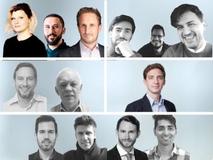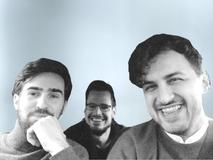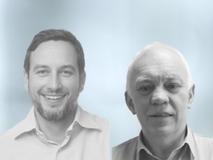CHF 10,000 for a device enhancing preterm infant nutrition, AI control for automatic doors, a 3-D LIDAR imaging technology, antibodies for the treatment of Leukemia, and an e-learning platform for healthcare
30.03.2021
Babylat, Eleatec, Foxight, Phire Therapeutics, and RapMed win Venture Kick's first stage of financial and entrepreneurial support. Their projects allow fast and efficient protein extraction from human milk in a short time; makes a door control unit that works safely even if a forklift driver doesn’t; develop a differentiated 3-D LIDAR imaging technology that would enable machines to build a vision of the external environment, make decisions and develop foresight; develop a novel immunologic approach to selectively eliminate the patient’s healthy and diseased hematopoietic cells, and develop an e-learning platform that offers the most effective education in diagnostic imaging and robust algorithms for detection of diseases.
 |
 BABYLAT’s Founder & CEO Dr. Zina Yudina, CSO Dr. Nino Nikolovski, CFO Simone Businaro
|
 Eleatecs founders: Alexander Hayes, Philippe Wenk, and Abtin Houshan
|
 Foxight: Jakub Jancovic and Miroslav Šulc
|
 Phire Therapeutics: CEO Dr. Jonathan Kiefer
|
 RapMed: David Puertas, Lukas Gintowt, Maurice Henkel, Victor Parmar
|
Babylat: enhancing preterm infant nutrition
Premature infants with very low birth weight (<1.5kg) need four times higher protein contents than human milk alone can provide (most optimal food for any neonate). Without additional fortification of human milk by extra-protein content, these infants cannot gain weight, which can lead to lifelong neurodevelopmental disorders. Around 1.5%-3% of all neonates have a very low birth weight and need protein-enriched milk daily during the first 2-3 months of their lives. BABYLAT’s Founder & CEO Dr. Zina Yudina, CFO Simone Businaro, MBA and CSO Dr. Nino Nikolovski develop a novel automated device - BABYLAT Enricher - which concentrates the protein fraction from human milk on-site in hospitals. Their innovative proprietary technology allows fast and efficient protein extraction from human milk in a short time and no analogous automated devices are available on market. Their target market (the top 30 developed countries by GDP plus Brazil) include ca 2'000 potential customers (hospitals with NICUs) and 350'000 preterm infants treated there per year.
They plan to use the Venture Kick fund for the prototype development. babylat.com
Eleatec: AI control for automatic doors in cold storage
Premature infants with very low birth weight (<1.5kg) need four times higher protein contents than human milk alone can provide (most optimal food for any neonate). Without additional fortification of human milk by extra-protein content, these infants cannot gain weight, which can lead to lifelong neurodevelopmental disorders. Around 1.5%-3% of all neonates have a very low birth weight and need protein-enriched milk daily during the first 2-3 months of their lives. BABYLAT’s Founder & CEO Dr. Zina Yudina, CFO Simone Businaro, MBA and CSO Dr. Nino Nikolovski develop a novel automated device - BABYLAT Enricher - which concentrates the protein fraction from human milk on-site in hospitals. Their innovative proprietary technology allows fast and efficient protein extraction from human milk in a short time and no analogous automated devices are available on market. Their target market (the top 30 developed countries by GDP plus Brazil) include ca 2'000 potential customers (hospitals with NICUs) and 350'000 preterm infants treated there per year.
They plan to use the Venture Kick fund for the prototype development. babylat.com
Eleatec: AI control for automatic doors in cold storage
Tall automatic industrial doors in cold storage facilities are often rammed by forklifts. Nearly every operator approaches the door before it is fully opened – and hen they’re already close, it’s hard to look up to see where the door panels are. This risks injury, and requires repairs that cost several thousand dollars and take up to three weeks. During this time factory operations can be severely disrupted. Eleatec makes a door control unit that thinks ahead to get out of the way even for a speeding F1 car. It’s the only controller that works safely even if a forklift driver doesn’t. They will retro-fit and upgrade existing doors to prevent collisions and reduce airflow by 2 to 4 times, which saves many thousand USD in cooling costs per door per year, protects the cold chain, and prevents contamination by dust and insects. Eleatecs founders are Alexander Hayes (co-founder/CEO of a VK-backed ETH Spinoff, and Country Manager of an acquired startup), Philippe Wenk (PhD student at ETH Center for Learning Systems), and Abtin Houshan (ETH graduate and F1 aerodynamics engineer at Alfa Romeo Racing). They are initially focused on dominating the $ 200 B cold storage sector by selling through door manufacturers and maintenance firms, and later expand to other industrial automatic door sectors. Their end goal is to reach $ 1 B in annual revenue through mass production of self-calibrating controllers and SaaS models enabled by their product.
Eleatec will use Venture Kick funds to test their MVPs with their first customer.
Foxight: 3-D LIDAR imaging technology
Autonomous cars are now becoming a reality. There are still several key challenges that need to be solved so that autonomous driving can take off at scale. The latest technologies are facing key issues like high costs, fragility of components or immense computing power required to build good enough models of the reality. To address these issues Foxight, co-founded by IMD MBA, Jakub Jancovic, and a university Professor, Miroslav Šulc,who is a member of Academy of Science in the Czech Republic and is a visiting researcher in CERN, is developing a differentiated 3-D LIDAR imaging technology that would enable machines to build a vision of the external environment, make decisions and develop foresight. Their solution is based on a concept of Lidar extended with benefits of camera technologies, bridging visual and space recognition to provide augmented camera 3-D imaging. Their customers would be traditional transportation manufacturers, autonomous driving high-tech companies and other mobility providers. The addressable market is estimated at ~$0.5bn growing at 20%+ and the total autonomous driving Lidar market is expected to reach over $12bn by 2030.
They plan to use the Venture Kick first stage fund to cover costs for instrumentation and external services.
Foxight: 3-D LIDAR imaging technology
Autonomous cars are now becoming a reality. There are still several key challenges that need to be solved so that autonomous driving can take off at scale. The latest technologies are facing key issues like high costs, fragility of components or immense computing power required to build good enough models of the reality. To address these issues Foxight, co-founded by IMD MBA, Jakub Jancovic, and a university Professor, Miroslav Šulc,who is a member of Academy of Science in the Czech Republic and is a visiting researcher in CERN, is developing a differentiated 3-D LIDAR imaging technology that would enable machines to build a vision of the external environment, make decisions and develop foresight. Their solution is based on a concept of Lidar extended with benefits of camera technologies, bridging visual and space recognition to provide augmented camera 3-D imaging. Their customers would be traditional transportation manufacturers, autonomous driving high-tech companies and other mobility providers. The addressable market is estimated at ~$0.5bn growing at 20%+ and the total autonomous driving Lidar market is expected to reach over $12bn by 2030.
They plan to use the Venture Kick first stage fund to cover costs for instrumentation and external services.
Phire Therapeutics: novel bispecific antibody for the treatment of Acute Myeloid Leukemia
Acute Myeloid Leukemia is a disease of an ageing population. Since it originates from stem cells in the bone marrow, the only cure for AML patients is a radical elimination of their own hematopoietic system and the rescue with a hematopoietic stem cell transplantation (HSCT). To this day, this elimination is being performed with extensive chemotherapy. The majority of AML patients are elderly people who are unfit to receive these toxic therapies. Allogeneic hematopoietic stem cell transplantation (allo-HSCT) is a powerful intervention to cure life-threatening hemato- lymphatic diseases. Preparation (“conditioning”) for HSCT requires combination of unspecific chemo-immuno-therapy and in some cases gamma-irradiation in order to remove healthy and malignant blood and immune cells. Many patients who might benefit from a HSCT are not eligible for it as conditioning is associated with severe off-target side-effects. The team behind Phire Therapeutics found itself during a 4-year long collaborative effort between ETH Zürich and University Hospital Zürich. Prof. Markus Manz is the chair of the Department of Medical Oncology and Hematology at USZ. Prof. Dario Neri is Full Professor and Chair of Biomacromolecules at ETH Zürich. Both will be Scientific Adivsors to Phire Therapeutics. Dr. Jonathan Kiefer is Pioneer Fellow at ETH Zürich. He is a Molecular Biotechnologist by training and generated novel antibody molecules at the German Cancer Research Center (DKFZ, Heidelberg) and at MIT in Cambridge, USA. At Phire Therapeutics, they are developing a novel immunologic approach to selectively eliminate the patient’s healthy and diseased hematopoietic cells and therefore enable HSCT and potential cure. With this we aim to be the catalyst that enables three times more HSCTs and thus regeneration of a healthy blood system. The market for hematopoietic stem cell transplants is growing at compound annual growth rate (CAGR) of 6%. Every year more and more patients can be treated by a HSCT, so the number of performed transplants rises every year. The projected value of the total market in 2021 is estimated to be $15.9 billion.
The funds from Venture Kick will be used for Business Development purposes of the future incorporated company Phire Therapeutics.
RapMed: e-learning platform offering education in diagnostic imaging and algorithms for detection of diseases
Data in healthcare is growing by 2722%/year. In contrast, the number of physicians required to manage this huge amount of data is only growing by 2%/year. The majority of this data is generated in the field of diagnostic imaging. To address this gap, physicians and complementary instruments like machine learning (ML) are required. Data from clinical routine do not meet the quality requirements for the training of physicians and the development of algorithms. The problem is the high effort in the preparation of training data sets for both education of physicians and development of ML. RapMed is an e-learning platform developed by Maurice Henkel and Victor Parmar that offers the most effective education in diagnostic imaging and robust algorithms for detection of diseases. Both developers are working in the research department of radiology of the University Hospital Basel. Medical students and residents are an enormous unexploited resource of medical knowledge. RapMeds e-Learning platform uses crowdsourcing to transform this vast resource of medical knowledge into useable swarm intelligence. Localization of findings in a medical exam can be calculated from the response of thousands of students and residents. Response quality can be improved via adaptive learning and quality assessments by trained physicians. In this way, costs for image preparation can be substantially reduced and with 1 million medical students and residents worldwide1, a large corpus of images can be prepared rapidly. The total serviceable market is valued to be 25% of US$ 7.4 Bn = US$ 1.85 Bn.
The Venture Kick Funds will be used for the presentation of 3D Datasets and to deliver a larger selection of modalities that will increase the attractiveness of the platform.


